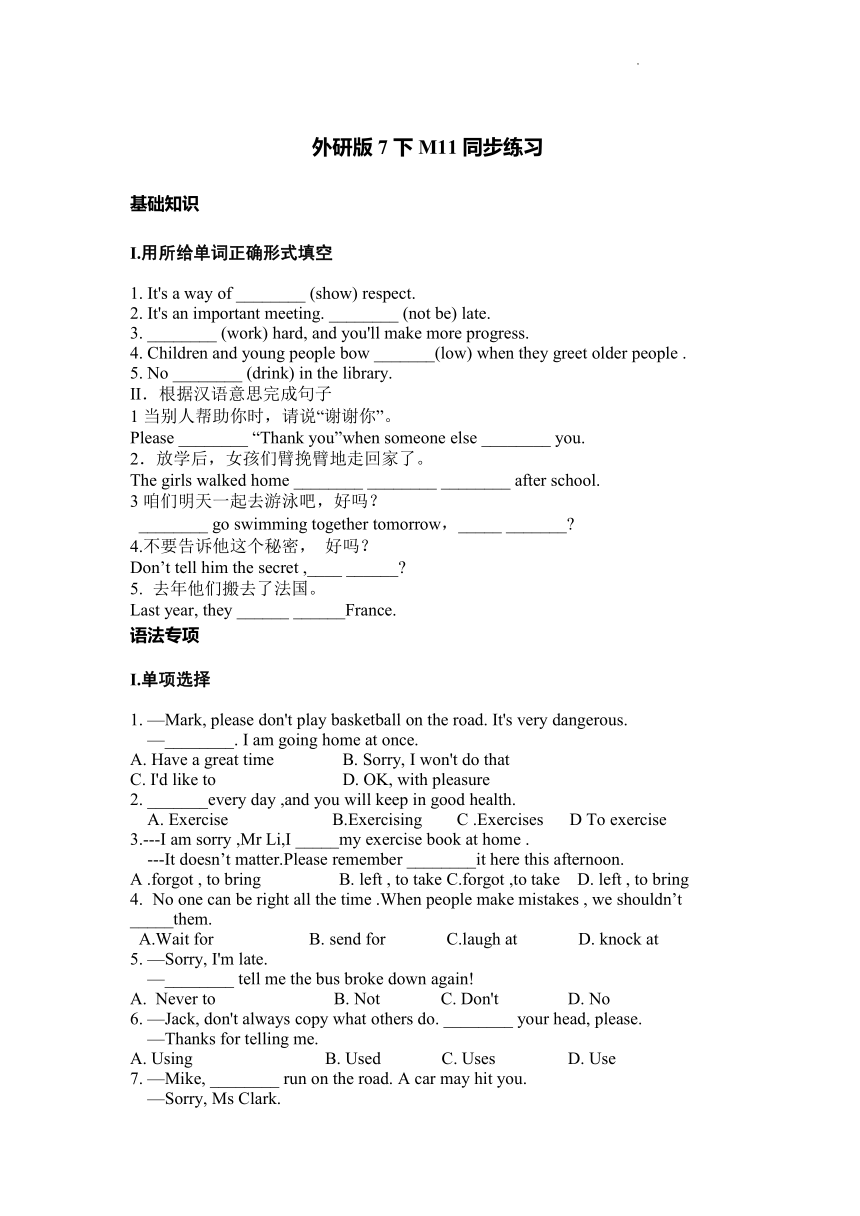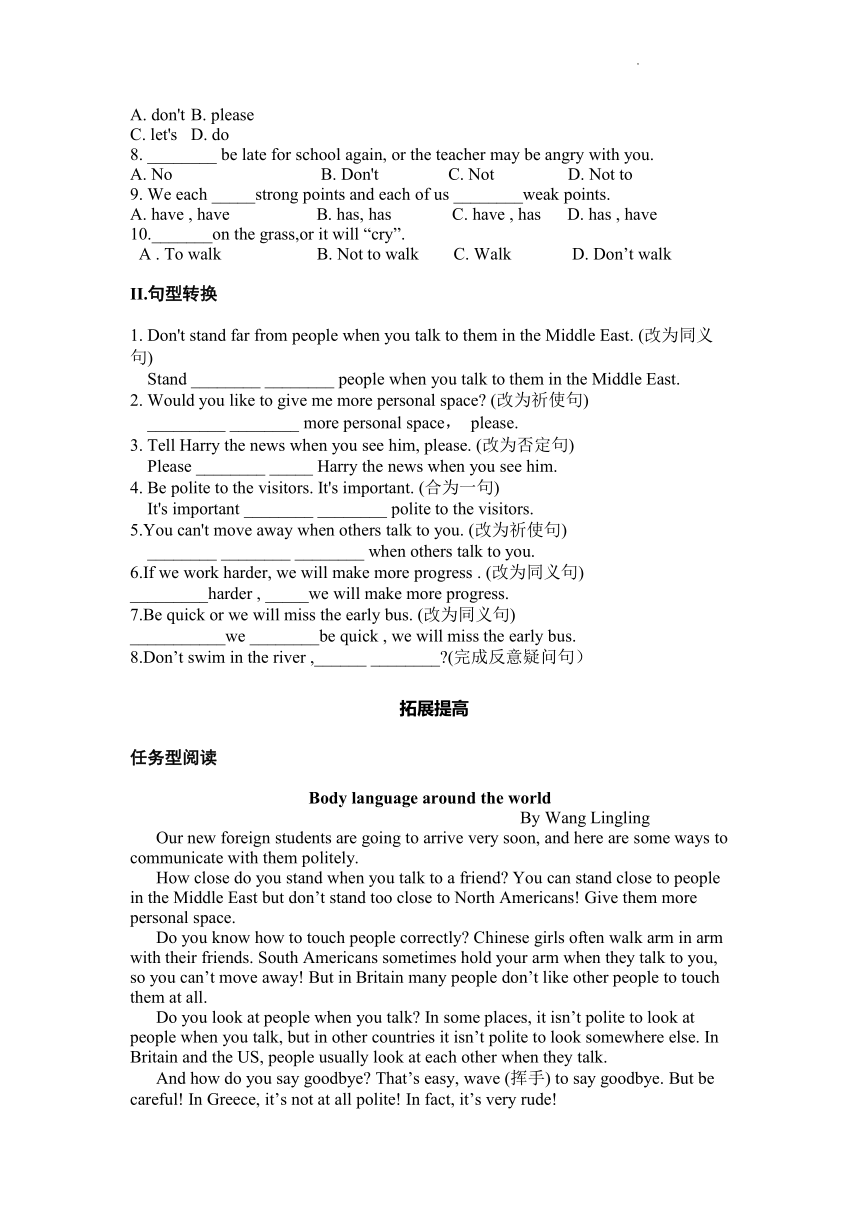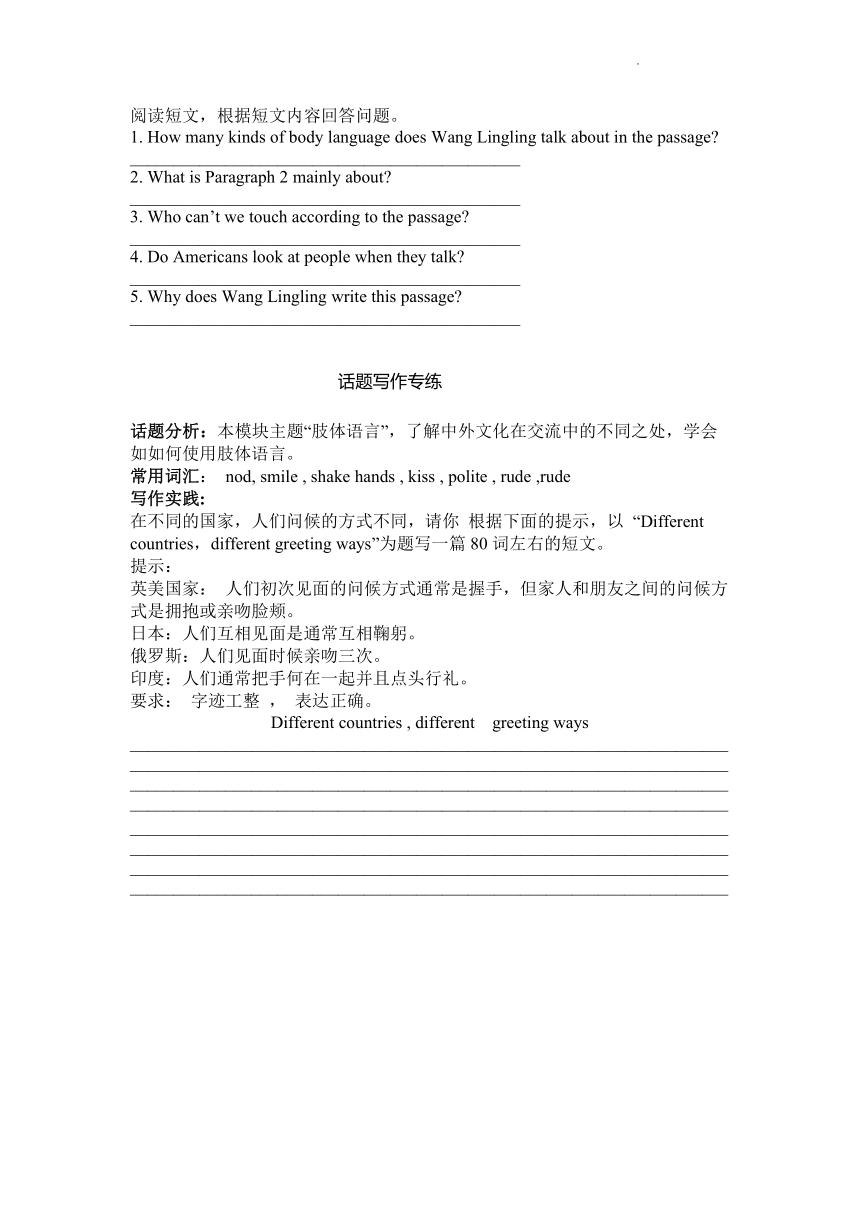Module11 Body language 同步练习(含答案)
文档属性
| 名称 | Module11 Body language 同步练习(含答案) |

|
|
| 格式 | docx | ||
| 文件大小 | 35.5KB | ||
| 资源类型 | 教案 | ||
| 版本资源 | 外研版 | ||
| 科目 | 英语 | ||
| 更新时间 | 2022-04-08 00:00:00 | ||
图片预览



文档简介
外研版7下M11同步练习
基础知识
I.用所给单词正确形式填空
1. It's a way of ________ (show) respect.
2. It's an important meeting. ________ (not be) late.
3. ________ (work) hard, and you'll make more progress.
4. Children and young people bow _______(low) when they greet older people .
5. No ________ (drink) in the library.
II.根据汉语意思完成句子
1当别人帮助你时,请说“谢谢你”。
Please ________ “Thank you”when someone else ________ you.
2.放学后,女孩们臂挽臂地走回家了。
The girls walked home ________ ________ ________ after school.
3咱们明天一起去游泳吧,好吗?
________ go swimming together tomorrow,_____ _______
4.不要告诉他这个秘密, 好吗?
Don’t tell him the secret ,____ ______
去年他们搬去了法国。
Last year, they ______ ______France.
语法专项
I.单项选择
1. —Mark, please don't play basketball on the road. It's very dangerous.
—________. I am going home at once.
A. Have a great time B. Sorry, I won't do that
C. I'd like to D. OK, with pleasure
2. _______every day ,and you will keep in good health.
A. Exercise B.Exercising C .Exercises D To exercise
3.---I am sorry ,Mr Li,I _____my exercise book at home .
---It doesn’t matter.Please remember ________it here this afternoon.
A .forgot , to bring B. left , to take C.forgot ,to take D. left , to bring
No one can be right all the time .When people make mistakes , we shouldn’t _____them.
A.Wait for B. send for C.laugh at D. knock at
5. —Sorry, I'm late.
—________ tell me the bus broke down again!
Never to B. Not C. Don't D. No
6. —Jack, don't always copy what others do. ________ your head, please.
—Thanks for telling me.
A. Using B. Used C. Uses D. Use
7. —Mike, ________ run on the road. A car may hit you.
—Sorry, Ms Clark.
A. don't B. please
C. let's D. do
8. ________ be late for school again, or the teacher may be angry with you.
A. No B. Don't C. Not D. Not to
9. We each _____strong points and each of us ________weak points.
A. have , have B. has, has C. have , has D. has , have
10._______on the grass,or it will “cry”.
A . To walk B. Not to walk C. Walk D. Don’t walk
II.句型转换
1. Don't stand far from people when you talk to them in the Middle East. (改为同义句)
Stand ________ ________ people when you talk to them in the Middle East.
2. Would you like to give me more personal space (改为祈使句)
_________ ________ more personal space, please.
3. Tell Harry the news when you see him, please. (改为否定句)
Please ________ _____ Harry the news when you see him.
4. Be polite to the visitors. It's important. (合为一句)
It's important ________ ________ polite to the visitors.
5.You can't move away when others talk to you. (改为祈使句)
________ ________ ________ when others talk to you.
6.If we work harder, we will make more progress . (改为同义句)
_________harder , _____we will make more progress.
7.Be quick or we will miss the early bus. (改为同义句)
___________we ________be quick , we will miss the early bus.
8.Don’t swim in the river ,______ ________ (完成反意疑问句)
拓展提高
任务型阅读
Body language around the world
By Wang Lingling
Our new foreign students are going to arrive very soon, and here are some ways to communicate with them politely.
How close do you stand when you talk to a friend You can stand close to people in the Middle East but don’t stand too close to North Americans! Give them more personal space.
Do you know how to touch people correctly Chinese girls often walk arm in arm with their friends. South Americans sometimes hold your arm when they talk to you, so you can’t move away! But in Britain many people don’t like other people to touch them at all.
Do you look at people when you talk In some places, it isn’t polite to look at people when you talk, but in other countries it isn’t polite to look somewhere else. In Britain and the US, people usually look at each other when they talk.
And how do you say goodbye That’s easy, wave (挥手) to say goodbye. But be careful! In Greece, it’s not at all polite! In fact, it’s very rude!
阅读短文,根据短文内容回答问题。
1. How many kinds of body language does Wang Lingling talk about in the passage
_____________________________________________
2. What is Paragraph 2 mainly about
_____________________________________________
3. Who can’t we touch according to the passage
_____________________________________________
4. Do Americans look at people when they talk
_____________________________________________
5. Why does Wang Lingling write this passage
_____________________________________________
话题写作专练
话题分析:本模块主题“肢体语言”,了解中外文化在交流中的不同之处,学会
如如何使用肢体语言。
常用词汇: nod, smile , shake hands , kiss , polite , rude ,rude
写作实践:
在不同的国家,人们问候的方式不同,请你 根据下面的提示,以 “Different countries,different greeting ways”为题写一篇80词左右的短文。
提示:
英美国家: 人们初次见面的问候方式通常是握手,但家人和朋友之间的问候方式是拥抱或亲吻脸颊。
日本:人们互相见面是通常互相鞠躬。
俄罗斯:人们见面时候亲吻三次。
印度:人们通常把手何在一起并且点头行礼。
要求: 字迹工整 , 表达正确。
Different countries , different greeting ways
____________________________________________________________________________________________________________________________________________________________________________________________________________________________________________________________________________________
____________________________________________________________________________________________________________________________________________________________________________________________________________________________________________________________________________________
M11答案
基础知识
I.1. showing 2. Don’t be 3 Work 4. lower 5 drinking
II.1.say helps 2. arm in arm 3. Let’s shall we 4.will you 5.moved to
语法专项练
I.1-5.B ADCC 6-10 DABCD
II.
1.close to....
2.Give me
3.don’t tell
4.to be
5.Don’t move away
Work and
7.If don’t
8.will you
拓展提高
[语篇解读] 本文介绍了四种身体语言。
1. Four/4. 通读全文可知,本文介绍了四种身体语言。
2. How close do you/we stand when you/we talk to a friend 第二段讲的是“和朋友说话时应该离得多近”。
3. The British/English (people). 根据第三段中的“But in Britain many people don’t like other people to touch them at all.”可推断,我们不能触碰英国人。
4. Yes, they do/Yes. 根据第四段中的“In Britain and the US, people usually look at each other when they talk.”可知,美国人说话的时候看着对方,故本题要用肯定回答。
5. To introduce/tell some body language around the world. 本文的写作目的是介绍世界各地的一些身体语言。
话题写作专练
One possible version:
Different countries, different greeting ways
People in different countries greet each other in different ways.In America and Britain, people often shake hands when they meet for the first time.Friends and family members often hug or kiss the cheeks.In Japan, people usually bow to greet each other.In Russia, people usually kiss three times, left, right, left.In India, people put their hands together and nod their heads when they meet.
If you greet people in right ways, you may make them happy and they may think you're polite.
基础知识
I.用所给单词正确形式填空
1. It's a way of ________ (show) respect.
2. It's an important meeting. ________ (not be) late.
3. ________ (work) hard, and you'll make more progress.
4. Children and young people bow _______(low) when they greet older people .
5. No ________ (drink) in the library.
II.根据汉语意思完成句子
1当别人帮助你时,请说“谢谢你”。
Please ________ “Thank you”when someone else ________ you.
2.放学后,女孩们臂挽臂地走回家了。
The girls walked home ________ ________ ________ after school.
3咱们明天一起去游泳吧,好吗?
________ go swimming together tomorrow,_____ _______
4.不要告诉他这个秘密, 好吗?
Don’t tell him the secret ,____ ______
去年他们搬去了法国。
Last year, they ______ ______France.
语法专项
I.单项选择
1. —Mark, please don't play basketball on the road. It's very dangerous.
—________. I am going home at once.
A. Have a great time B. Sorry, I won't do that
C. I'd like to D. OK, with pleasure
2. _______every day ,and you will keep in good health.
A. Exercise B.Exercising C .Exercises D To exercise
3.---I am sorry ,Mr Li,I _____my exercise book at home .
---It doesn’t matter.Please remember ________it here this afternoon.
A .forgot , to bring B. left , to take C.forgot ,to take D. left , to bring
No one can be right all the time .When people make mistakes , we shouldn’t _____them.
A.Wait for B. send for C.laugh at D. knock at
5. —Sorry, I'm late.
—________ tell me the bus broke down again!
Never to B. Not C. Don't D. No
6. —Jack, don't always copy what others do. ________ your head, please.
—Thanks for telling me.
A. Using B. Used C. Uses D. Use
7. —Mike, ________ run on the road. A car may hit you.
—Sorry, Ms Clark.
A. don't B. please
C. let's D. do
8. ________ be late for school again, or the teacher may be angry with you.
A. No B. Don't C. Not D. Not to
9. We each _____strong points and each of us ________weak points.
A. have , have B. has, has C. have , has D. has , have
10._______on the grass,or it will “cry”.
A . To walk B. Not to walk C. Walk D. Don’t walk
II.句型转换
1. Don't stand far from people when you talk to them in the Middle East. (改为同义句)
Stand ________ ________ people when you talk to them in the Middle East.
2. Would you like to give me more personal space (改为祈使句)
_________ ________ more personal space, please.
3. Tell Harry the news when you see him, please. (改为否定句)
Please ________ _____ Harry the news when you see him.
4. Be polite to the visitors. It's important. (合为一句)
It's important ________ ________ polite to the visitors.
5.You can't move away when others talk to you. (改为祈使句)
________ ________ ________ when others talk to you.
6.If we work harder, we will make more progress . (改为同义句)
_________harder , _____we will make more progress.
7.Be quick or we will miss the early bus. (改为同义句)
___________we ________be quick , we will miss the early bus.
8.Don’t swim in the river ,______ ________ (完成反意疑问句)
拓展提高
任务型阅读
Body language around the world
By Wang Lingling
Our new foreign students are going to arrive very soon, and here are some ways to communicate with them politely.
How close do you stand when you talk to a friend You can stand close to people in the Middle East but don’t stand too close to North Americans! Give them more personal space.
Do you know how to touch people correctly Chinese girls often walk arm in arm with their friends. South Americans sometimes hold your arm when they talk to you, so you can’t move away! But in Britain many people don’t like other people to touch them at all.
Do you look at people when you talk In some places, it isn’t polite to look at people when you talk, but in other countries it isn’t polite to look somewhere else. In Britain and the US, people usually look at each other when they talk.
And how do you say goodbye That’s easy, wave (挥手) to say goodbye. But be careful! In Greece, it’s not at all polite! In fact, it’s very rude!
阅读短文,根据短文内容回答问题。
1. How many kinds of body language does Wang Lingling talk about in the passage
_____________________________________________
2. What is Paragraph 2 mainly about
_____________________________________________
3. Who can’t we touch according to the passage
_____________________________________________
4. Do Americans look at people when they talk
_____________________________________________
5. Why does Wang Lingling write this passage
_____________________________________________
话题写作专练
话题分析:本模块主题“肢体语言”,了解中外文化在交流中的不同之处,学会
如如何使用肢体语言。
常用词汇: nod, smile , shake hands , kiss , polite , rude ,rude
写作实践:
在不同的国家,人们问候的方式不同,请你 根据下面的提示,以 “Different countries,different greeting ways”为题写一篇80词左右的短文。
提示:
英美国家: 人们初次见面的问候方式通常是握手,但家人和朋友之间的问候方式是拥抱或亲吻脸颊。
日本:人们互相见面是通常互相鞠躬。
俄罗斯:人们见面时候亲吻三次。
印度:人们通常把手何在一起并且点头行礼。
要求: 字迹工整 , 表达正确。
Different countries , different greeting ways
____________________________________________________________________________________________________________________________________________________________________________________________________________________________________________________________________________________
____________________________________________________________________________________________________________________________________________________________________________________________________________________________________________________________________________________
M11答案
基础知识
I.1. showing 2. Don’t be 3 Work 4. lower 5 drinking
II.1.say helps 2. arm in arm 3. Let’s shall we 4.will you 5.moved to
语法专项练
I.1-5.B ADCC 6-10 DABCD
II.
1.close to....
2.Give me
3.don’t tell
4.to be
5.Don’t move away
Work and
7.If don’t
8.will you
拓展提高
[语篇解读] 本文介绍了四种身体语言。
1. Four/4. 通读全文可知,本文介绍了四种身体语言。
2. How close do you/we stand when you/we talk to a friend 第二段讲的是“和朋友说话时应该离得多近”。
3. The British/English (people). 根据第三段中的“But in Britain many people don’t like other people to touch them at all.”可推断,我们不能触碰英国人。
4. Yes, they do/Yes. 根据第四段中的“In Britain and the US, people usually look at each other when they talk.”可知,美国人说话的时候看着对方,故本题要用肯定回答。
5. To introduce/tell some body language around the world. 本文的写作目的是介绍世界各地的一些身体语言。
话题写作专练
One possible version:
Different countries, different greeting ways
People in different countries greet each other in different ways.In America and Britain, people often shake hands when they meet for the first time.Friends and family members often hug or kiss the cheeks.In Japan, people usually bow to greet each other.In Russia, people usually kiss three times, left, right, left.In India, people put their hands together and nod their heads when they meet.
If you greet people in right ways, you may make them happy and they may think you're polite.
同课章节目录
- Module 1 Lost and found
- Unit 1 Whose bag is this?
- Unit 2 Are they yours?
- Unit 3 Language in use
- Module 2 What can you do ?
- Unit 1 I can play the piano
- Unit 2 I can run really fast
- Unit 3 Language in use
- Module 3 Making plans
- Unit 1 What are you going to do at the weekends?
- Unit 2 We're going to cheer the players.
- Unit 3 Language in use
- Module 4 Life in the future
- Unit 1 Everyone will study at home
- Unit 2 Every family will have a small plane.
- Unit 3 Language in use
- Module 5 Shopping
- Unit 1 What can I do for you?
- Unit 2 You can buy everything on the Internet
- Unit 3 Language in use
- Module 6 Around town
- Unit 1 Could you tell me how to get to the Nationa
- Unit 2 The London Eye is on your right.
- Unit 3 Language in use
- Revision module A
- Module 7 My past life
- Unit 1 I was born in a small village.
- Unit 2 I was born in Quincy.
- Unit 3 Language in use
- Module 8 Story time
- Unit 1 Once upon a time….
- Unit 2 Goldilocks hurried out of the house.
- Unit 3 Language in use
- Module 9 Life history
- Unit 1 He left school and began work at the age of
- Unit 2 He decided to be an actor.
- Unit 3 Language in use
- Module 10 A holiday journey
- Unit 1 What did you do?
- Unit 2 This morning we took a walk.
- Unit 3 Language in use
- Module 11 Body language
- Unit 1 They touch noses!
- Unit 2 Here are some ways to welcome them.
- Unit 3 Language in use
- Module 12 Western music
- Unit 1 It's so beautiful!
- Unit 2 Vienna is the centre of European classical
- Unit 3 Language in use
- Revision module B
